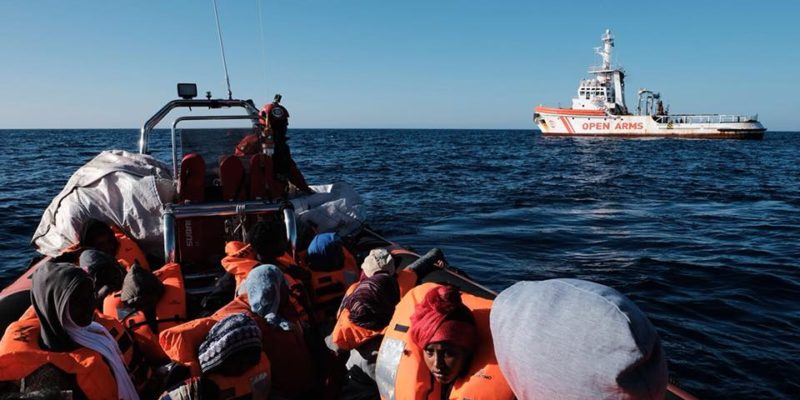Update: as of Tuesday, March 27, 2018, the criminal conspiracy charge has been dropped, Prosecutor Carmelo Zuccaro removed from the investigation, and the investigation handed over to prosecutors in Ragusa, which was the competent authority in the first place. The seizing of the ship is confirmed and so is the charge of facilitating illegal immigration for the captain and the head of mission (charges against ProActiva Open Arms general coordinator, Gerard Canals, have been dropped*). The new documents also show an involvement of the Italian Navy in the events of March 15.
The preventive seizure order for the Open Arms (OA), a ship operated by the Spanish NGO ProActiva Open Arms, reconstructs the events which took place between March 15 and 18 while the vessel was on a rescue operation in the Mediterranean.
The NGO itself had provided real-time updates on these events on social media, writing about an “emergency in international waters”. The group’s rescue activities had also been documented on March 16 by the Italian Coast Guard, and their report does not mention any conflicts.
From the documents we know that the NGO has been charged with criminal conspiracy and aiding illegal immigration, and that the accused are the ship’s captain and the mission leader on board, as well as (“in concert with”) ProActiva Open Arms general coordinator, Gerard Canals, who at the time was in Barcelona*. The order was issued by the same prosecutor from Catania who had accused NGOs last summer, accusations which led to the seizure of the Iuventa, a ship from the German NGO Jugend Rettet (we wrote about it here and here).
The first part of the seizure order states that, on March 15, “in the waters off the Libyan coast,” the accused carried out a rescue operation for “event 164” (a SAR event means that one or more rubber boats are in distress). As the ship’s crew themselves announced on that day, 218 people were rescued.
According to the judiciary, Open Arms conducted this rescue operation despite the fact that the Italian Maritime Rescue Center in Rome, which is generally responsible for coordinating rescue efforts, had informed the Spanish crew that the Libyan Coast Guard would be in charge of operations. The Libyan Coast Guard is said to have requested “explicitly in writing that they did not want anyone in the event area to ensure safety during the rescue operation.”
In one passage the order also states, “All operations were carried out in Libyan SAR waters”, though elsewhere it mentions international waters.
According to the judiciary, the crew of the Open Arms claim to have lost radio contact with their lifeboats (rigid-hulled inflatable boats, or RHIB), which were 20 miles away, and that they would have been unable to call them off. The ship’s captain and the mission leader are said to have consulted with each other and with the coordinator in Spain, and to have decided to carry on with search and rescue operations.
The papers do not mention a Libyan Coast Guard patrol approaching the Open Arms and threatening to open fire unless rescued migrants were turned over (“if you don’t, we’ll kill you”). ProActiva Open Arms has released footage of the incident.
The documents also say that, only two hours after the rescue, while heading north, the Open Arms asked the command center in Rome to be granted a docking port to evacuate the migrants (later, they wrote that they had been denied a port for having refused to turn over the migrants). The command responded that they could not assign them a docking port because Libya was the competent authority, and that the Open Arms should ask their flag state of Spain. Officers on board relayed the information to their NGO and awaited instructions, while continuing to head north.
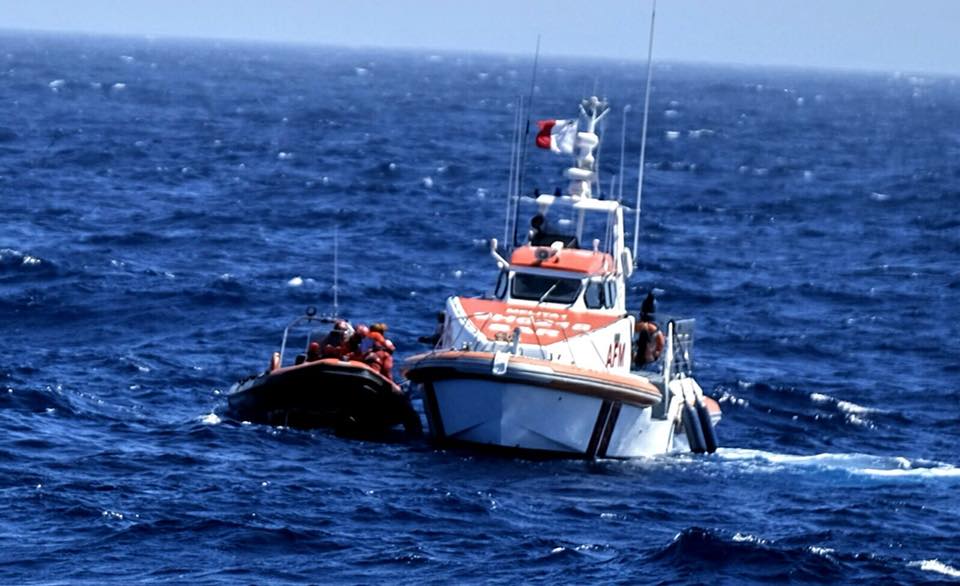
Image taken from the ProActiva Open Arms Facebook page
On the morning of March 16, at the urging of the ship’s captain, the Open Arms arrived in Maltese SAR waters and evacuated a critically ill three-month-old baby and its mother on the island after being granted permission – an evacuation which took the entire morning. The order states, “the Maltese authorities asked the captain what his intentions were, to which he replied that he would resume the ship’s journey and leave the territory of Malta.” It is completely unclear whether the Open Arms was offered the option of disembarking the migrants in Malta or whether it might have been granted a port for all the migrants on board, and thus whether the captain refused an offer.
Soon afterwards, the command in Rome suggested that, given their proximity, the ship also ask permission to dock in Malta. The Open Arms crew repeated its request to the Italian authorities and, once again, were told to ask Spain instead. Malta said they never received a request from the ship; Rome insisted that they ask Spain; Spain in turn insisted that the ship’s captain ask Malta, which he continued not to do, convinced as he was that they would be refused. “Eventually” (the documents offer no other explanation) Rome granted permission to dock in Pozzallo, where the ship found the police waiting.
The second section of the order, which lays out the grounds for the charges, reads: “the behaviour of the accused is in violation of the Code of Conduct issued by the Italian authorities, signed by several NGOs and, at any rate, legally binding for any one contacting the Rome MRCC.” It is unclear why the prosecutor is invoking the (uncertain) legal significance of the code, since the same rules applied before the code itself was issued, as the law requires all vessels to report to the command in Rome for coordination, which is precisely what the Open Arms did.
The order also claims that, by refusing to leave the rescue operations to the Libyans and failing to ask permission to dock in Malta, the Open Arms jeopardised the migrants’ lives, who would not have otherwise been in immediate danger (which is when the duty to rescue arises). The documents, however, offer no evidence of Malta having been willing to take in the 218 rescued migrants, only speculation.
What are the grounds for prosecuting?
“Crimes of solidarity” at sea are now a reality: rescuing someone from a shipwreck and taking them to Italy can carry a jail sentence. Naturally, solidarity is never explicitly mentioned in connection to these offenses, but it is the concept that informed the prosecutor’s decision to order the seizure of the Open Arms.
To understand the legal grounds for the seizure order, we spoke with attorney Francesco Del Freo, an expert in transnational criminal law. Strictly speaking, the rules can be interpreted as being against the NGO: “the Open Arms’ actions do qualify as criminal behaviour, and [Catania prosecutor] Zuccaro had grounds for ordering the seizure of the ship,” he explained. “They deliberately violated orders issued by the Italian authority. Dura lex sed lex: the law dictates that the migrants be handed over to the Libyans. Otherwise, it would be chaos.”
This is the first item in the Code of Conduct for NGOs, issued in August of last year by the Ministry of the Interior. The Code mentions Libyan territorial waters, whereas the rescue operation was conducted in international waters (73 miles off the coast, according to the Open Arms). The MRCC in Rome assigned coordination to the Tripoli Coast Guard. If an NGO were to intervene at all, it would then be expected to hand the migrants over to the Libyans.
NGOs have always tried to avoid this kind of evacuation, as it deprives the migrants of the opportunity to seek asylum and leads to detention in centres where the United Nations (see the latest UNSMIL report from February) have found repeated violations of human rights. “The opinion of the UN cannot be regarded as a source of law. Everything that happens must be considered in the light of existing legislation,” Francesco Del Freo argued. Therefore, refusing to hand migrants over is essentially an act of civil disobedience, an act that, while politically valid, is necessarily subject to prosecution. Still, to the NGOs, turning the migrants over to the Libyan Coast Guard amounts to a betrayal of their humanitarian mandate.
Even if it has no legislative strength, as it merely reaffirms international laws, the Code of Conduct itself makes seizure a very real possibility for anyone disregarding its rules: “Failure to […] comply with the commitments set out therein may result in the adoption by the Italian Authorities of measures addressed to the relevant vessels.” In short: seizure of NGO boats.
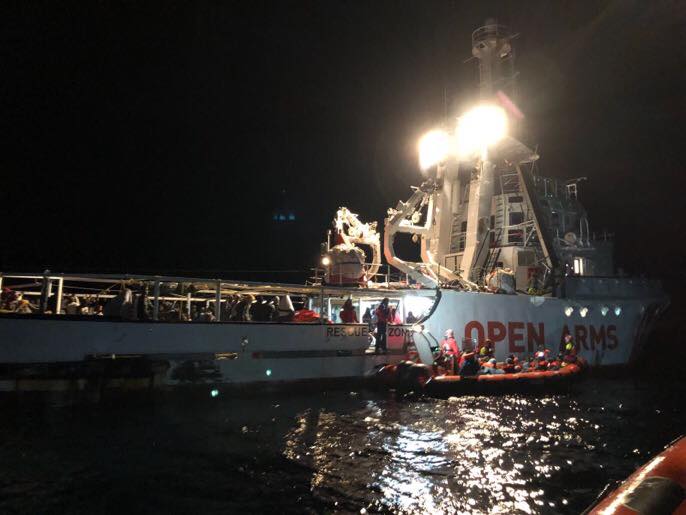
Image taken from the ProActiva Open Arms Facebook page
But something else was also implied by the prosecutor: intervening on three occasions before the Libyans who were in charge of the operation and ignoring orders to the contrary has to mean that the humanitarian workers were colluding with the smugglers. The order never states this explicitly, but the gravity of the charges, as well as the NGO leaders’ alleged complicity, suggests that the prosecution is reinforcing the equation “NGOs=sea taxi-services”, the same equation that provided the grounds for the case against the Iuventa.
In the case of the Iuventa, the charges were based on encounters between supposed NGO rubber boats and boats that the prosecution claimed belonged to people smugglers. Often, these boats had a criminal record, as we documented in the case of the Shada.
However, in the case of the Open Arms, all of this has been left to deduction. There were no suspicious encounters, only orders that were ignored: the order not to intervene before the Libyan Coast Guard and the order to ask Malta for permission to disembark migrants.
Unlike the documents on the seizure of the Iuventa, the order for the seizure of the Open Arms does not mention the location of rescue operations, only referring to “international waters”. According to social media posts from the NGO, the standoff with the Libyan Coast Guard took place between 4.50 p.m. and 5.30 p.m. on March 15, 73-74 miles off the coasts of Libya. The Open Arms was heading north in search of an SAR event, and along the way “came across” two other boats in distress, for which Libya was also the competent authority. Looking at the sea routes on the Marine Traffic website, it is impossible to determine the distance between the PC Bigliani Ras Jadir 648 (the Italian patrol boat donated to the Libyans that took part in the SAR operations and threatened the Open Arms) and the rescue locations: military vessels cannot always be tracked by public software. The same Libyan patrol was involved in the November 2017 standoff with the Sea Watch (this video at 22’25’’). As Amnesty International has revealed, Italy donated the Ras Jadir to the Libyan authorities in two ceremonies: the first in the port of Gaeta (Italy) on April 21, 2017, and the second in the port of Abu Sittah (Libya) on May 15, 2017.
Libya is the competent authority for the rescue operations because the events tool place in the search and rescue region (SRR) it had been assigned – on paper. However, as with everything related to Tripoli, it is unclear whether this SRR even exists. SRRs are recognised by the International Maritime Organization (IMO), an agency of the United Nations. Every member State notifies the IMO about the size of the SRR, and the IMO conducts an internal assessment to determine whether the region is proportionate to the number of boats available to the country in the case of an SAR event. The SRR notification is entered in an IMO database, the Global Integrated Shipping Information System (GISIS). Currently, there is no trace of a notification from Libya, a country that has not even signed the 1979 International Convention on Maritime Search and Rescue or the Convention on Migrants’ Rights.
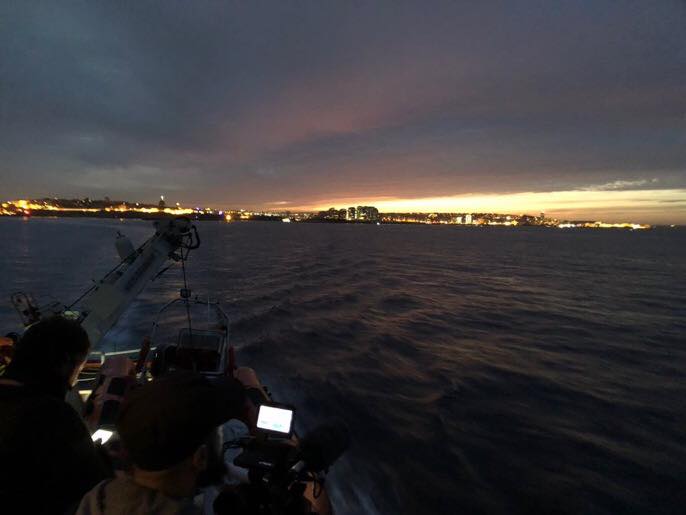
Image taken from the ProActiva Open Arms Facebook page
Libya has not even granted the IMO its own MRCC. In fact, it exists only on board the ship Tremiti, a boat from the Italian Coast Guard docked at Tripoli, which reports directly to Rome. It has existed since the signing of the Memorandum of Understanding between Italy and Libya, at the same time when Italy was training the Libyan Coast Guard. Plans are also underway to establish a Libyan Maritime Rescue Coordination Centre (LMRCC) “led by the Italian Coast Guard and funded by the European Commission,” the IMO explained. With the end of the legislature and the formation of a new government – and an increasingly complex situation in Libya – it is hard to tell whether these plans will come to fruition.
At about 9 a.m. on March 16, the Open Arms was heading north. The Marine Traffic website shows that the ship was flanked by the Melita I, a boat from the Maltese Coast Guard. In a rough sea, the ship evacuated the mother and its baby. It is unclear what happened afterwards. Logically, the safest docking port would have been Malta, but Catania’s prosecutor has written that, following the evacuation, the ship’s captain did not comply with MRCC orders to request permission to dock there because he believed that Malta would not grant it. Why?
His behaviour did not conform to the rules, but it was certainly based on experience: Malta only accepts individual evacuations when someone’s life is in imminent danger. It is its customary practice. Two years ago, in November 2015, Euobserver quoted the director of the Jesuit Refugee Service, Katrine Camilleri, who believed that the number of arrivals in Malta had dropped following an agreement between then-Prime Minister of Italy Matteo Renzi and Maltese PM Joseph Muscat, under which Italy would take in all Malta-bound arrivals in exchange for the right to oil exploration in Maltese waters. Malta’s government, for its part, has repeatedly denied the existence of any such deal; nevertheless, the country has taken in very few migrants, a fact that is also due to a lack of reception facilities.
The prosecution’s case against the Open Arms sets an important precedent. It is the first time that the leaders of an organisation are accused of complicity in aiding illegal immigration. These are no longer isolated instances of rescue activities deemed suspicious because of how they were conducted: the doubt is now being cast on the very intentions of the NGOs to begin with. The conflict that began last summer is at a critical point, with the prosecutor of Catania and the Ministry of the Interior on one side and what little remains of the NGOs at sea on the other. Whatever the violations, it seems obvious that the prosecutors are intent on keeping NGO ships away from rescue operations, thereby making their job impossible or unnecessary.
What ProActiva Open Arms says
“This was a rescue operation of people whose lives were in danger, carried out in international waters,” Oscar Camps, founder of ProActiva Open Arms, said in a press conference at the Senate on Wednesday, March 21. “We are very proud,” he added, “that we were able to bring all these people to safety in Pozzallo. But I have to say that the authorities did not make our job easy”.
The day began with a call from the Italian Coast Guard operations centre, signalling a boat in distress some 25 miles off the Libyan coast. The Open Arms proceeded to rescue 117 people. “On that occasion, we were warned that the so-called Libyan Coast Guard would be present to coordinate operations. It was the first time something like that had happened: it meant that they would replace the IMRCC,” Riccardo Gatti, the ProActiva Open Arms mission leader, told us.
Subsequently, the crew received another call. When the Open Arms reached the boat, they found it empty: the Libyan patrol had got there first, and taken the migrants back.
Later on, the ship received a third call from the IMRCC about a boat in distress with 101 people on board, more than 73 miles off the coast of Libya. Again, the Libyans would coordinate operations. Once the ship reached the area, the Open Arms commenced rescue activities, taking women and children on board first.
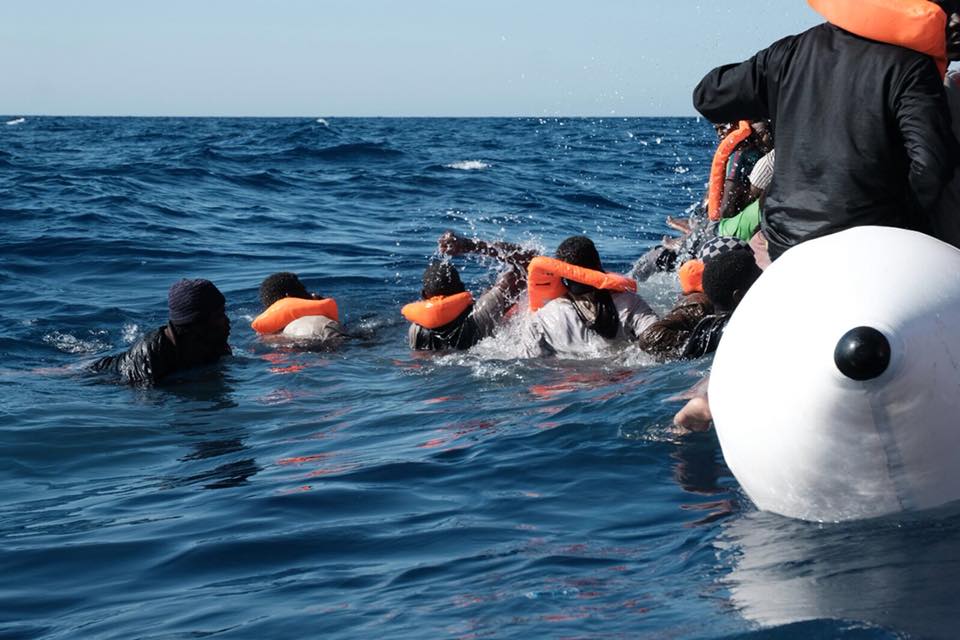
Image taken from the ProActiva Open Arms Facebook page
At that point, a Libyan Coast Guard patrol arrived, blocking the NGO’s RHIB and threatening to open fire on them unless they handed over the rescued migrants. The Spanish crew refused. “The request,” Gatti explained, “came after the threat to shoot us. There are international laws against deportation and refoulement. The rescue is considered done when the people have been evacuated to a safe place, which can be a ship, but it has to be safe.” Besides, he added, “We cannot trust the Libyan Coast Guard, who have ‘attacked’ us on three occasions: once they threatened us, another time they fired shots into the air, and a third time they kidnapped us for hours.”
The presence of Libyans made the migrants panic. Camps remembers how, upon seeing the weapons, ten people threw themselves into the sea: “three workers carrying out a rescue with a small boat cannot face armed Libyans, but they cannot disregard the will of the people they are rescuing either. We were facing death threats, and then we had ten people who were in danger of drowning.”
Meanwhile, the rubber boats had lost radio contact with the Open Arms. “We lost them when they were twenty miles off. The prosecution wrote that that was just an excuse, but it wasn’t,” Gatti explained.
Suddenly, after two hours, the Libyans withdrew. The Open Arms requested a port, but the Italian government chose to defer to the Spanish government instead. While waiting, the ship kept sailing north: “empirically we were heading to Italy, because that’s where we have always been sent over the course of 43 missions and 80 dockings,” Gatti explained. As for the controversy over docking in Malta, he added: “Italy told us that it was up to the Spanish government to request a port. We don’t know what Malta told Spain, and they didn’t say anything to us directly. But then we know from experience that they haven’t been accepting migrants for ten years, if not longer.” Camps was more outspoken, and insisted that the IMRCC is “the authority in charge of assigning ports. They cannot shrug off responsibility.”
Eventually, the ship was granted permission to dock at Pozzallo. “When we docked, we thought we were the victims of an attack. We cooperated and gave statements as we always do, only this time the statements were much longer than usual. But then the outcome was very different than we expected.”
According to Alessandro Gamberini, the mission leader’s attorney, the seizure order is “lacking serious and coherent arguments”, and “a stretch”: “what is striking is the prosecutor’s claim: if the NGO had been only charged with aiding illegal immigration, the competent judiciary would be Ragusa [the province in which Pozzallo is located]. However, through the District Anti-Mafia Directory, the prosecutor in Catania also brought a charge of criminal conspiracy, which allows a transfer of authority.” The order, Gamberini added, “also mentions a Libyan SAR area that is actually not available to Libya. Giving coordination responsibilities over to Libya is invalid, and, as such, the order has no basis in fact or law.”
As for the supposed violations of the Code of Conduct for NGOs, outgoing senator and human rights activist Luigi Manconi noted: “the code has no legal force. It is a treaty agreement between the Ministry and an individual. I do not find that a violation occurred, and if it did, it certainly would not constitute a crime.” Furthermore, in the Code, “information to the flag state qualifies more as a commitment, while saving those in danger is an obligation. The hierarchy is very clear.”
Cover image taken from the ProActiva Open Arms Facebook page.
Translation by Francesco Graziosi. Proofreading by Alex Booth.




